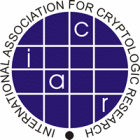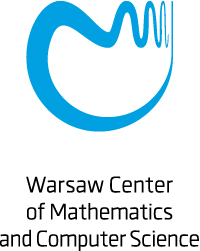Twelfth IACR Theory of Cryptography Conference
TCC 2015
March 23 to 25, 2015
Warsaw, Poland


TCC 2015: Accepted Papers
- “A Little Honesty Goes a Long Way: The Two-Tier Model
for Secure Multiparty Computation”
Juan Garay (Yahoo Labs), Ran Gelles (Princeton University), David Johnson (Columbia University), Aggelos Kiayias (University of Athens), Moti Yung (Google, Columbia University)
“A Rate-Optimizing Compiler for Non-malleable Codes Against Bit-wise Tampering and Permutations”
Shashank Agrawal (UIUC), Divya Gupta (UCLA), Hemanta K. Maji (UCLA), Omkant Pandey (UIUC), Manoj Prabhakaran (UIUC)“Adaptively Secure Two-party Computation From Indistinguishability Obfuscation”
Ran Canetti (Tel Aviv University & Boston University), Shafi Goldwasser (Weizmann Institute & MIT), Oxana Poburinnaya (Boston University)“Adaptively Secure, Universally Composable, Multi-Party Computation in Constant Rounds”
Dana Dachman-Soled (UMD), Jonathan Katz (UMD), Vanishree Rao (UCLA)
“An Alternative Approach to Non-black-box Simulation in Fully Concurrent Setting”
Susumu Kiyoshima (NTT)“An Efficient Transform from Sigma Protocols to NIZK with a CRS and Non-Programmable Random Oracle”
Yehuda Lindell (Bar Ilan University)“Augmented Pseudorandom Functions and Connections to Learning”
Aloni Cohen (MIT), Shafi Goldwasser (MIT & the Weizmann Institute of Science), Vinod Vaikuntanathan (MIT)“Complete Characterization of Fairness in Secure Two-Party Computation of Boolean Functions”
Gilad Asharov (School of Computer Science & Engineering, Hebrew University of Jerusalem, Jerusalem, Israel), Amos Beimel (Department of Computer Science, Ben Gurion University, Be’er Sheva, Israel), Nikolaos Makriyannis (Departament de Tecnologies de la Informació i les Comunicacions, Universitat Pompeu Fabra, Barcelona, Spain), Eran Omri (Department of Computer Science and Mathematics, Ariel University, Ariel, Israel)“Constrained Key-Homomorphic PRFs from LWE (Or) How to Secretly Embed a Circuit in Your PRF”
Zvika Brakerski (Weizmann Institute of Science), Vinod Vaikuntanathan (MIT)
“Constructing and Understanding Chosen Ciphertext Security via Puncturable Key Encapsulation Mechanisms”
Takahiro Matsuda (RISEC, AIST, Japan), Goichiro Hanaoka (RISEC, AIST, Japan)
“From Single-Bit to Multi-Bit Public-Key Encryption via Non-Malleable Codes”
Sandro Coretti (ETH Zurich), Ueli Maurer (ETH Zurich), Björn Tackmann (UC San Diego), Daniele Venturi (Sapienza University of Rome)“From Weak to Strong Zero-Knowledge and Applications”
Kai-Min Chung (Academia Sinica), Edward Lui (Cornell University), Rafael Pass (Cornell University)“Function-Private Functional Encryption in the Private-Key Setting”
Zvika Brakerski (Weizmann Institute), Gil Segev (Hebrew University)“Functional Encryption for Randomized Functionalities”
Vipul Goyal (Microsoft Research), Abhishek Jain (JHU), Venkata Koppula (UT-Austin), Amit Sahai (UCLA)“Functional Encryption for Randomized Functionalities in the Private-Key Setting from Minimal Assumptions”
Ilan Komargodski (Weizmann institute of Science), Gil Segev (Hebrew University of Jerusalem), Eylon Yogev (Weizmann institute of Science)“General Statistically Secure Computation with Bounded-Resettable Hardware Tokens”
Nico Döttling (Aarhus University, Denmark), Daniel Kraschewski (TNG Technology Consulting GmbH, Munich, Germany), Jörn Müller-Quade (Karlsruhe Institute of Technology, Germany), Tobias Nilges (Karlsruhe Institute of Technology, Germany)“Graph-Induced Multilinear Maps from Lattices”
Craig Gentry (IBM), Sergey Gorbunov (MIT), Shai Halevi (IBM)“Key-Homomorphic Constrained Pseudorandom Functions”
Abhishek Banerjee (Georgia Institute of Technology), Georg Fuchsbauer (IST Austria), Chris Peikert (Georgia Institute of Technology), Krzysztof Pietrzak (IST Austria), Sophie Stevens (University of Bristol)“Leakage-resilient non-malleable codes”
Divesh Aggarwal (EPFL), Stefan Dziembowski (University of Warsaw), Tomasz Kazana (University of Warsaw), Maciej Obremski (University of Warsaw)“Locally Decodable and Updatable Non-Malleable Codes and Their Applications”
Dana Dachman-Soled (UMD), Feng-Hao Liu (UMD), Elaine Shi (UMD), Hong-Sheng Zhou (VCU)“Multi-Client Verifiable Computation with Stronger Security Guarantees”
S. Dov Gordon (Applied Communication Sciences), Jonathan Katz (University of Maryland), Feng-Hao Liu (University of Maryland), Elaine Shi (University of Maryland), Hong-Sheng Zhou (Virginia Commonwealth University)Non-committing encryption from Phi-hiding”
Brett Hemenway (UPenn), Rafail Ostrovsky (UCLA), Alon Rosen (IDC Herzliya)“Non-Malleable Condensers for Arbitrary Min-Entropy, and Almost Optimal Protocols for Privacy Amplification”
Xin Li, (Johns Hopkins University)
“Obfuscating Circuits via Composite-Order Graded Encoding”
Benny Applebaum (Tel Aviv University), Zvika Brakerski (Weizmann Institute of Science)“Obfuscation-based Non-black-box Simulation and Four Message Concurrent Zero Knowledge for NP”
Omkant Pandey (UIUC), Manoj Prabhakaran (UIUC), Amit Sahai (UCLA)“Obfuscation of Probabilistic Circuits and Applications”
Ran Canetti (Boston University & Tel Aviv University), Huijia Lin (UC Santa Barbara), Stefano Tessaro (UC Santa Barbara), Vinod Vaikuntanathan (MIT)“Oblivious Polynomial Evaluation and Secure Set-Intersection from Algebraic PRFs”
Carmit Hazay (Faculty of Engineering, Bar-Ilan University, Israel)
“On Basing Size-Verifiable One-Way Functions on NP-Hardness”
Andrej Bogdanov (Chinese University of Hong Kong), Christina Brzuska (Tel Aviv University)“On Obfuscation with Random Oracles”
Ran Canetti (Boston University & Tel Aviv University), Yael Tauman Kalai (Microsoft Research), Omer Paneth (Boston University)“On the Indifferentiability of Key-Alternating Feistel Ciphers with No Key Derivation”
Chun Guo (State Key Laboratory of Information Security (SKLOIS), Institute of Information Engineering (IIE), Chinese Academy of Sciences (CAS), University of Chinese Academy of Sciences (UCAS)), Dongdai Lin (State Key Laboratory of Information Security (SKLOIS), Institute of Information Engineering (IIE), Chinese Academy of Sciences (CAS))“On the Regularity of Lossy RSA: Improved Bounds and Applications to Padding-Based Encryption”
Adam Smith, Ye Zhang (Penn State University)
“Optimal Algebraic Manipulation Detection Codes in the Constant-Error Model”
Ronald Cramer (CWI Amsterdam & Mathematical Institute, Leiden University), Carles Padro (UPC Barcelona), Chaoping Xing (NTU Singapore)“Outlier Privacy”
Edward Lui (Cornell University), Rafael Pass (Cornell University)“Primary-Secondary-Resolver Membership Proof Systems”
Moni Naor, Asaf Ziv (Weizmann Institute of Science)“Public Coin Differing-Inputs Obfuscation and Its Applications”
Yuval Ishai (Technion), Omkant Pandey (UIUC), Amit Sahai (UCLA)“Public Verification of Private Effort”
Giulia Alberini (McGill), Tal Moran (IDC Herzliya), Alon Rosen (IDC Herzliya)“Random-Oracle Uninstantiability from Indistinguishability Obfuscation”
Christina Brzuska (Microsoft Research Cambridge, UK), Pooya Farshim (Queen's University Belfast, Northern Ireland, UK), Arno Mittelbach (Darmstadt University of Technology, Germany)“Resettably Sound Zero-Knoweldge Arguments from OWFs - the (semi) Black-Box way”
Rafail Ostrovsky (UCLA, USA), Alessandra Scafuro (Boston University & Northeastern University, USA), Muthuramakrishnan Venkitasubramaniam (University of Rochester, USA)“Richer Efficiency/Security Trade-offs in 2PC”
Vladimir Kolesnikov (Bell Labs), Payman Mohassel (Yahoo Labs), Ben Riva (Bar-Ilan University), Mike Rosulek (Oregon State University)“Round-Efficient Concurrently Composable Secure Computation via a Robust Extraction Lemma”
Vipul Goyal (Microsoft Research), Huijia Lin (UCSB), Omkant Pandey (UIUC), Rafael Pass (Cornell Tech), Amit Sahai (UCLA)“Secure Physical Computation using Disposable Circuits”
Ben Fisch (Columbia University), Daniel Freund (Cornell University), Moni Naor (Weizmann Institute)“Separations in Circular Security for Arbitrary Length Key Cycles”
Venkata Koppula, Kim Ramchen, Brent Waters (University of Texas, Austin)“Stretching Groth-Sahai: NIZK Proofs of Partial Satisfiability”
Carla Ràfols (Ruhr-University Bochum)“Tamper Detection and Continuous Non-Malleable Codes”
Zahra Jafargholi (Northeastern University), Daniel Wichs (Northeastern University)“The Power of Negations in Cryptography”
Siyao Guo (Chinese University of Hong Kong), Tal Malkin (Columbia University), Igor C. Oliveira (Columbia University), Alon Rosen (IDC Herzliya, Israel)“The Randomized Iterate Revisited - Almost Linear Seed Length PRGs from A Broader Class of One-way Functions”
Yu Yu (Shanghai Jiao Tong University), Dawu Gu (Shanghai Jiao Tong University), Xiangxue Li (East China Normal University), Jian Weng (Jinan University)“Tight Parallel Repetition Theorems for Public-Coin Arguments using KL-divergence”
Kai-Min Chung (Academia Sinica, Taiwan), Rafael Pass (Cornell University)“Tightly-Secure Authenticated Key Exchange”
Christoph Bader (Ruhr-University Bochum, Germany), Dennis Hofheinz (Karlsruhe Institute of Technology, Germany), Tibor Jager (Ruhr-University Bochum, Germany), Eike Kiltz (Ruhr-University Bochum, Germany), Yong Li (Ruhr-University Bochum, Germany)“Topology-Hiding Computation”
Tal Moran (Herzliya IDC), Ilan Orlov (Herzliya IDC), Silas Richelson (UCLA)“Two-Round Adaptively Secure MPC from Indistinguishability Obfuscation”
Sanjam Garg (University of California, Berkeley), Antigoni Polychroniadou (Aarhus University)
“Verifiable Random Functions from Weaker Assumptions”
Tibor Jager (Ruhr-University Bochum)“ZAPs and Non-Interactive Witness Indistinguishability from Indistinguishability Obfuscation”
Nir Bitansky (MIT), Omer Paneth (Boston University)


